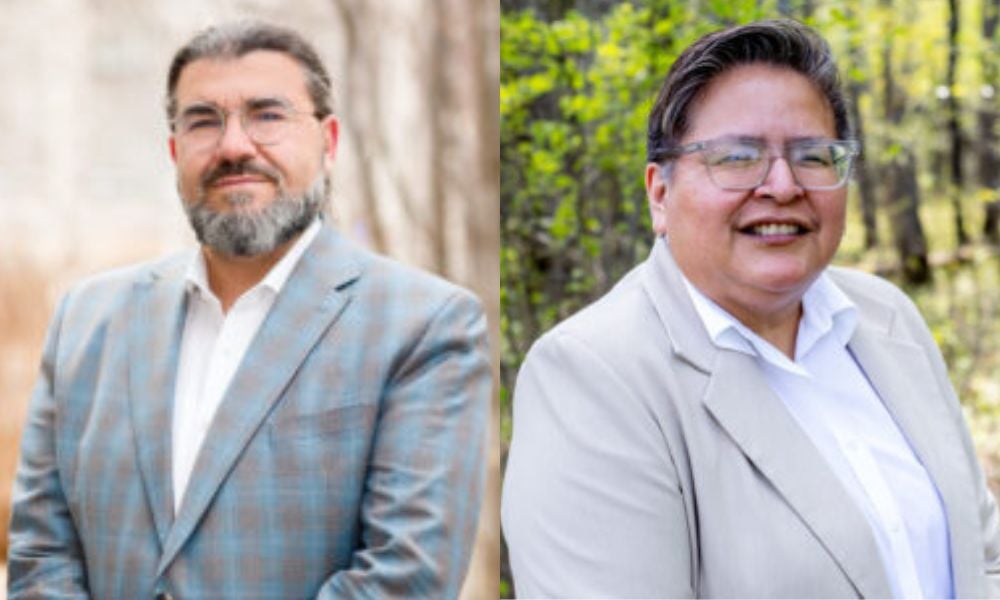
Nadir André says he plans to bring more work to the law firm in the specific claims area

JFK Law has expanded its Indigenous law practice with veteran lawyer Nadir André, who joined the firm as a partner alongside associates Isabelle Simard and Lauren Daniel.
The Aboriginal law firm’s managing partner, Sara Mainville, says the focus is shifting from expansion to consolidation.
“We are stabilizing all the growth that we’ve had since I joined in 2022… We’re not looking to grow for growth’s sake.”
André’s legal career began in solo practice before he transitioned to a regional Quebec firm and, eventually, spent over a decade at Borden Ladner Gervais LLP. A Matimekush-Lac John First Nation member, he specializes in treaty rights, nation-to-nation negotiations, and Indigenous governance.
He sees an opportunity to complement JFK Law’s existing work by bringing experience in the specific claims area – a legal field involving the federal government's historical wrongdoings against First Nations, particularly regarding land administration and treaty obligations.
“I think we bring a couple of specialized areas that maybe JFK has not done as much in the past. So, if JFK clients have specific claims and they don’t quite have the services for it, that’s an area where we can offer support.”
He adds that the plan is to expand JFK’s offering and grow his areas of expertise within the firm. JFK Law, he says, also has its sights on new markets, particularly in the Atlantic region.
Having spent years in a national law firm environment, André says the most valuable skills he gained weren’t necessarily legal – but operational. These include managing conflicts, onboarding files, adopting new technologies, and working in multidisciplinary teams.
He adds that while JFK Law is smaller than BLG in overall size, it has a deeper bench in Indigenous law.
“I’m not downsizing. I’m expanding in terms of sector focus.”
André says he successfully brought most of his book of business with him to JFK. While some matters remained with his former firm due to specific expertise or ongoing file engagement, most clients followed him to JFK. Crucially, he says, the transition was smooth.
Rather than take an “all mine” approach, André says he prioritized client interests.
“Sometimes the right call is to let a file stay where it is.”
He says he had transparent discussions with his clients and former firm to determine what was best for each matter.
“We didn’t have to fight over the files… Some stay, some go – and everyone agreed. That honesty earns long-term respect,” he says.
Bringing his associates with him was also a deliberate decision to ensure continuity and address the complexities of practising in Quebec.
He says local expertise is necessary due to civil and common law differences.
Also, with most Indigenous clients in the province being Anglophone – but a significant minority Francophone – André says having French-speaking, Quebec-trained lawyers is essential.
Equally important, he says, is client continuity, adding that he encourages a hands-on approach for his associates.
“I don't keep them behind doing the work. They actually come to meetings and have a relationship with the clients.”
From the client’s perspective, the firm may have changed, “but it’s still the same team,” he adds.
Mainville and André emphasize that Indigenous law relies on long-standing client relationships more than many other legal practice areas.
“Some of our clients we’ve worked with for decades,” Mainville says.
André agrees, noting that the “trusted advisor” role has guided his approach for years. He says he often declines short-term matters that don’t allow space to build meaningful client relationships.
“Maintaining trust means staying available and consistent. That’s what clients expect – and deserve.”
Reflecting on his career, André says one of the most important lessons for young lawyers entering Indigenous law is to remain grounded in the advisor role – not advocate for personal causes. “Don’t try to be more Indigenous than your clients.”
He says lawyers should respect client autonomy and avoid projecting their values onto files. André also encourages Indigenous law students to pursue areas beyond Aboriginal law – such as corporate, banking, or real estate – where their communities increasingly need legal expertise.
“Your people will need you there,” he says, adding that broader training opens more doors.
Sara Mainville echoes the call for versatility but cautions those starting their careers in service of their home communities. “Don’t get monopolized by any one client,” she advises, adding that limited exposure can hinder long-term development.